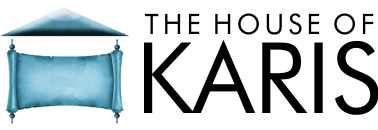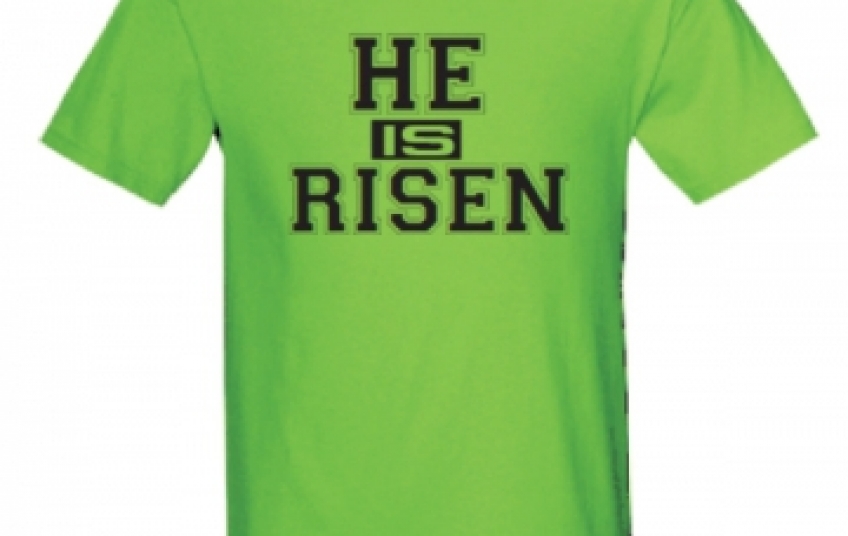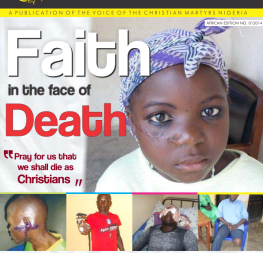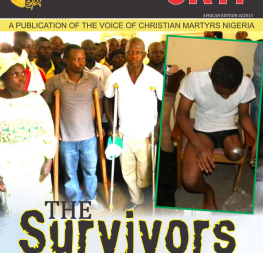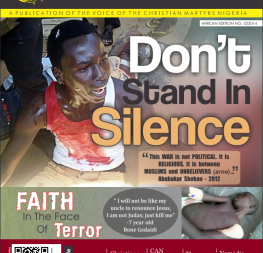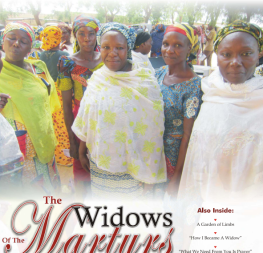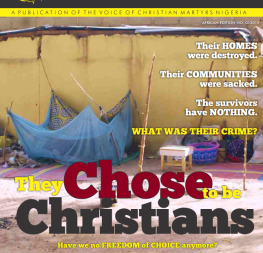His Eminence, Cardinal Okogie
His Grace, the Archbishop Adewale Martins
His Lordship, Bishop Matthew Kukah
Distinguished panelists on the high table,
Highly respected Priests and leaders of the Catholic Church
Distinguished Ladies and Gentlemen,
I wish to thank the Catholic Men’s Guild of the Church of Assumption, Falomo, Lagos, for the privilege to participate again in this Annual Conference deliberating on the State of the Nigerian Church. I want to thank Brother Matthew Egbadon who ensured that I participate in this year’s Conference. Of course, I would remember Mrs. Bridget Itsueli who graciously introduced me to the Men’s Guild.
I should mention that this would be the first time, as far as I can remember, that I am presenting a paper at a Christian meeting. Usually I would do a presentation or simply minister the Word of God. But I have a definite impression that God would want me to write what I am going to say at this Conference and read it.
My lord Bishop, distinguished ladies and gentlemen, we are facing a crisis in our generation the gravity of which has still not dawned on many Christians. On earth there are distresses while the signals from heaven are ominous. For now, many Christians console themselves that they have identified the enemy in the “Islamic Agenda”. However, I have had cause to make clear at various forums that “Islam is a threat but the Church is the problem”. The Nigerian Church is God’s barometer to gauge the health and the well being of the nation. As the Nigerian Church goes, so goes Nigeria.
The Church is the foundation and facilitator of whatever positive development Nigeria has achieved, thus far. Democracy, civilization, education, human rights, women’s right, technology, and rule of law, are all results of Judeo-Christian ideology. If Christianity should cease in Nigeria today, all these social values and virtues will disappear. That all these social values are compromised and shaky is the first indication that something serious has gone wrong with the Nigerian Church.
Today we are in anguish because almost every institution and infrastructure for nation building has collapsed in the country. However, we forget that darkness is simply the absence of light, for the same reason that terrorism and insurgency signal lack of peace and unity in the Church while poverty in Nigeria indicates lack of brotherly kindness in the Body of Christ. As Christians, the first institution we should scrutinize when the nation is going haywire is the Church. The Church is the Light of the world and it is the Salt of the earth. Once all is well with the Church, the nation shall be at peace.
Even Satanists acknowledge that without the endorsement of the Church, they cannot do anything. Alice Bailey, the 20th Century Satanist told her disciples, “whatever change you implement on the ground, get the Church to endorse it; get the Church to officially cede ground”. God’s authority on earth is vested in the Church. Whatever the Church binds on earth is bound in heaven and whatever the Church looses on earth is loosed in heaven.
A FAULTY FOUNDATION
It is pertinent to revisit the foundation of the Nigerian Church in looking at the “Impact of lack of Unity in CAN as threat to Christian Faith in Contemporary Nigeria”. Much of the problems we are grappling with today are the results of foundational crisis in the formative period of the Nigerian Church. Looking at the history of Christianity in Nigeria, it would appear that the early missionaries, though Godly servants of Christ and well intentioned, brought “denominations” to Nigeria and not the Body of Christ. This was the unfortunate consequence of the Colonial era during which Christianity came into the country.
Almost all the denominations that started Christianity in Nigeria were reporting to different foreign powers. For example, the Catholics were reporting to Rome, Italy, the Anglicans reported to England, the Methodist reported to Wales, the Lutherans reported to Germany, the Baptist reported to USA and so on. Given such diversity in command structure, the attitude of competition grew amongst brethren. It was on this foundation that the Nigerian Church was birthed.
After independence, the indigenous Church leaders not knowing any other pattern simply adopted what the Colonial masters handed over to them until 1976 when an unfortunate incident at Dodan Barracks in Lagos brought Nigerian Christian leaders face to face with the ugly reality of Christian disunity. On that same day, 27th August 1976, Christian Association of Nigeria (CAN) was formed with the goal “THAT THEY ALL MAY BE ONE”.
CHURCH UNITY: HOW FAR, HOW WELL?
With the benefit of hindsight, it would appear that in an attempt to solve the problem of Christian disunity, God established a Central Management Body for Christianity in Nigeria and called it CAN. The goal of CAN was spelled out from day one: “THAT THEY ALL MAY BE ONE”. Christian Association of Nigeria was not established to show the superiority of one denomination over the others; neither did God set it up to put money into the pockets of the Clergy. It was established by God to transfuse various arms in the Body of Christ to function as ONE BODY.
42 years after God entrusted the management of CAN into the hands of the Clergy, so “THAT THEY ALL MAY BE ONE”, we need to ask Church leaders some questions. These questions should be considered by Church leaders of all ranks and titles.
- 42 years after CAN was established and entrusted into the hands of the Clergy to manage and provide leadership, with the mandate “that they all may be one”, is the Nigerian Church united?
- How come 42 years after CAN was established, the Nigerian Church is more divided today than it was in 1976?
- How did the Clergy manage the Church such that 42 years after the central management body was formed, Nigeria emerged as the worst nation on earth for anyone to be called a Christian? (This is official US Congress affirmation on 4th February, 2017)
- When CAN was formed and the Clergy took over the reins of management, Christians were not murdered with impunity, Churches were not burnt and Christians were not IDPs in their own country. So, we can safely conclude Christianity was in a fairly stable condition in 1976. 42 years down the road, could the Nigerian Clergy explain what happened to the Nigerian Church?
- What were the Clergy managers of CAN looking at when Nigeria was Islamized through
- Membership of OIC in 1986
- Inclusion of Islamic law and jurisprudence in the Constitution of Nigeria in 1999? - How come Christians relate to each other as brethren at non-Church Fellowships but discriminate and ostracize each other at the Denominational levels? For example, let us consider a Fellowship like Full Gospel Businessmen Fellowship International which is made up of Christians from various denominations. The President of the Full Gospel might be Catholic and the Vice President might be Pentecostal while the National Secretary might be from White Garment Church. In the Fellowship, they would pray and fast together, plan programs and execute them together, contribute funds and manage it well. The only thing that matters to Christians at the various Fellowships is Romans 8: 9 “if any man have not the Spirit of Christ, he is none of his.” “Do you have the Spirit of Christ?” This is all that concerns Christians at the various Fellowships in the Nigerian Church. Once these same brethren return to their various denominations and Churches, we discover the attitude of “I am of Paul; and I of Apollos; and I of Cephas; and I of Christ.” 1 Cor. 1: 12. The same Clergy that erected the “invisible denominational barriers” is the same Clergy managing CAN that was established “that they all may be one”. Should anyone be surprised therefore, that Christian unity is still a mirage in Nigeria, even after 42 years of CAN?
- How was Christianity managed that the Church became victim of stealth Jihad while some Church leaders thrive as agents of stealth Jihad against the Church?
One needs to explain a little further about item 6 above. There is a sharp difference between Clergy and Laity leadership in the Church.
- Under Laity leadership in Christian fellowships/groups like FGBMFI, CLASFON (Christian lawyers), NEMA (National Evangelistic Management), Wailing Women International, Womb of Intercession International, and so on, what matters is: “Are you a Christian?”
- In the Churches, under the management of the Clergy, the question is, “Are you a member of our Church (Denomination/Ministry)?”
It is clear that the mandate “THAT THEY ALL MAY BE ONE” is fulfilled by the Laity leaders but violated by the Clergy leaders. The question therefore is why should the Clergy continue to manage CAN? After all, CAN is Christian Association of Nigeria it is not Clergy Association of Nigeria. At the very least, if the Clergy insist on retaining leadership, the Laity should be permitted to be involved since they have demonstrated ability to fulfill the mandate of heaven. As can be seen in the parable of talents, the servant is only relevant to the Master if the servant produces good result (Matt. 25: 14-30).
THE CAUSE OF DISUNITY
The main cause of Christian disunity in Nigeria is stealth Jihad and the strength of stealth Jihad is money. Stealth Jihad is the surreptitious incursion of the Islamists into the Church usually through financial inducements and granting of undue favor to influential Christian leaders so that they will look the other way while Islamism makes progress and advancement against Democracy. It should be understood that the first objective of Islamism is to supplant Democracy with Sharia Ideology. Once Sharia becomes entrenched, Christianity would die a natural death.
It is stealth Jihad that makes room for Conventional Jihad like Boko Haram and Fulani herdsmen to operate with impunity at such alarming scale and the golden wand of stealth Jihadists is simply money. It is an open secret that some Christian leaders are operatives of Intelligence Services controlled by Islamists in government while some go as far as collecting money from corrupt politicians and Muslim leaders. While some of the Clergy leaders in previous years were discreet, we have a new generation of Clergy leaders who operate stealth Jihad with impunity, recklessness and audacious disregard for God.
Until such a time that the Church would have leaders who shun covetousness and greed, Christian unity would remain elusive. The enemy knows that a divided Church is a weak Church so it regularly funds division by setting Christian leaders against Christian interests.
THE IMPACT OF DISUNITY IN CAN TO CHRISTIANITY
Due to the inability of CAN to forge Christians into one indivisible army of the Lord, the Church has been weakened and unable to stand before its enemies. Realistically speaking, Christianity is on the brink of extinction in Nigeria. The ascendancy of Sharia ideology in Nigeria rings the death toll for the Nigerian Church. It is therefore imperative that CAN must be restructured, as a matter of urgency, if Christianity is to survive. CAN belongs to every Christian in Nigeria and there is nothing wrong with the Association. It is the management that should be revisited and restructured.
It should be pointed out that there is no denomination that is powerful or influential enough to fight this battle alone. Therefore, a divided Christian Association makes every denomination and Bloc vulnerable. The Catholic Church in particular should face the reality that it is not as strong as it imagines it is to solely face global Islamism that has targeted Nigeria for Islamization in its relentless goal of converting Africa into an Islamic continent. The Catholic Church should be prepared to return completely into the fold of CAN and participate fully in providing leadership in these troublous times.
God has warned in 2013 that “if care is not taken, in 30 - 40 years Nigeria will be like Turkey”. In 2018, we can say, “in 25 years from now”. We are facing the risk of being the last Christians in Nigeria. Therefore, Christians should be in the frontline of defending democracy in Nigeria. The Church is the bastion of Democracy. A divided CAN cannot defend Democracy and promote Justice, Equity, and Fairness. Consequently, Sharia will grow stronger. As Sharia grows stronger, Democracy will become weaker and the Church will be emasculated out of existence.
Below are some of the impacts of a divided Church on Christianity in Nigeria:
- It was reported that on 4th February, 2017, the US Congress affirmed that the most dangerous nation on earth for anyone to be a Christian is Nigeria.
- There are five notable Islamist terror groups worldwide. The 1st most terrible is Boko Haram and the 4th is Fulani herdsmen. Both 1st and 4th operate in Nigeria.
- According to World Watch Monitor, over 60% of global Christian fatalities as a result of persecution are Nigerian Christians killed in Nigeria.
- A research report by Arne Mulder affirms that as of December 2014, over 13,000 Church buildings have been destroyed and abandoned in northern Nigeria.
- The current Federal Administration in Nigeria is openly pursuing an anti-Christian agenda that has resulted in countless murders of Christians all over the nation and destruction of vulnerable Christian communities. Just recently, Elder Statesman Gen. T. Y. Danjuma raised an alert that Christians should take steps to defend themselves.
- Mass burial of Christian victims of Jihad is becoming a regular occurrence in Nigeria. The most recent one was done by the Catholic Church a few days ago.
- Christians have been emasculated out of the security infrastructure in the country.
CAN IS THE HOPE OF CHRISTIANITY AND DEMOCRACY
In view of the challenges facing Christianity in Nigeria, and the poor report card of the Clergy entrusted with the management of CAN in the past 42 years, there is the need for an urgent overhauling of CAN. All hands must be on deck to transform CAN into a formidable Christian institution that is capable of protecting and promoting Christian interests in Nigeria. CAN must be delivered from the bondage of stealth Jihad and it must be established on probity, accountability, truth and righteousness. The present realities make it imperative that it can no longer be business as usual. This is the struggle that the National Christian Elders Forum (NCEF) is having with the current managers of CAN. The Bible makes it clear that some things might have been overlooked in the past but a time comes when present realities demand a reversal of systems and processes. Acts 17: 30 put it this way: “And the times of this ignorance God winked at; but now commandeth all men every where to repent:”
The unfortunate conclusion one is compelled to draw after observing the management of the Nigerian Church, is that many Church leaders manage Christianity for personal benefits and not for the collective interest of the Body of Christ or for the Lord and Savior Who called them into the ministry. It is for commercial advantage that invisible denominational barriers have been erected to separate brethren from freely fellowshipping together. Of course, there are some exceptions, but the indicted is far above average and that is very disturbing.
In view of the foregoing, I would wish to suggest as follows:
- An urgent Conference of Christian leaders in Nigeria is required. This Conference should involve both Clergy and Laity leaders and it should be convened without any delay.
- The current structure of CAN which vests management solely in the hands of the Clergy should be reviewed. A NEW CAN should emerge that would combine Clergy and Laity management of Christianity. The Laity Leaders have proven that they can provide Christian leadership that cuts across board and guarantees Christian unity while the Clergy has proven conclusively that it has failed in this regards.
- As the Catholic Church played a prominent role in the formation of CAN in 1976, the Catholic Church is required once again to champion a review and restructuring of CAN for the benefit of Christianity in Nigeria. After all, if Christians are in the vanguard of demand for restructuring Nigeria, should they not restructure themselves first?
- An Ethics and Values Committee should be established as an arm of CAN to handle cases of misconducts, particularly amongst the Clergy. Any Nigerian Christian should be free to lodge a complaint against any Church leader. This Ethics and Values Committee could be embedded in the Inter Denominational Relations Commission that is proposed in the Strategy Document of CAN. The current attitude of some Clergy suggesting that there is “immunity clause” in the Bible should be nullified. There is no “immunity clause” in the Bible. Every Church leader is accountable to members of the Church.
- The addiction of some Clergy to sharing of Security Vote should be cured through discipline and firm correction. CAN should be encouraged to be self funding through the strengthening of its internal organs.
- Christians must realize that they do not have all the time in the world. Whatever restructuring of CAN that they are going to do must be concluded in 2018. If the current faulty structure is carried into 2019, it might be too late to preserve Christianity in Nigeria.
UNDERSTANDING THE TIMES AND THE SEASONS
A victorious and triumphant Church must be able to discern the times and the seasons like the sons of Issachar. A spiritually blind Church will not only enter the ditch but it will take the entire nation along with it.
Christians need to understand how to handle problems that crop up in the nation and the appropriate response. For example, in 2015, the enemy was outside the Church but for 2019, the enemy is inside the Church. In 2015, the solution was not to vote for a particular Political Party while in 2019, the solution will be total return to truth and righteousness. In 2015, the enemy needed your support but in 2019, he can do without it. What will stop the enemy in 2019 is the righteousness of the saints.
Unfortunately, those who are supposed to provide spiritual direction for the Church have become blinded through covetousness and greed, like the Church in Laodicea. The NCEF puts it this way, “those who are supposed to cover us have uncovered us”. It is covetousness and greed that are used to recruit Christian leaders as agents of stealth Jihad. Today, the enemy does not need to directly fight the Church. The enemy simply uses Christians to disarm Christians.
In all of these, one is not issuing a blanket condemnation on all Christian leaders. Even in CAN, we still have Christian leaders who served and are still serving with integrity and place the interest of the Body of Christ above personal interest. However, such committed leaders are very few and they are exceptions rather than the norm. It is therefore the duty of every Christian to succor and strengthen the few righteous leaders in the Church. The first battle the Nigerian Church needs to win is the battle for truth and righteousness.
Please permit me to round up by sharing a conversation I once had with the Chairman of the National Christian Elders Forum, Mr. Solomon Asemota, SAN. Baba remarked to me, “These Church leaders seem to know something that you and I do not know.” I was curious to find out what they knew that the rest of Christians do not know. Baba solemnly told me, “I think they have discovered that there is no heaven and the rest of us are just deceiving ourselves. If they still believe there is heaven, they would not be doing the things they are doing”.
My lord Bishop, distinguished ladies and gentlemen, I thank you for your kind attention.
Bosun Emmanuel
Secretary
National Christian Elders Forum (NCEF)
PRESENTED BY BOSUN EMMANUEL AT CATHOLIC MEN’S GUILD ANNUAL CONFERENCE, CATHOLIC CHURCH OF ASSUMPTION, FALOMO, IKOYI, LAGOS HELD AT MUSON CENTRE, ONIKAN, LAGOS, ON SATURDAY 16TH JUNE, 2018 AT 10.00AM
